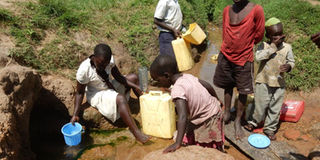Water crisis worries Dokolo residents

Ms Sarah Acen draws water from Atapi unprotected well in Dokolo Town on Thursday. PHOTO BY BILL OKETCH.
What you need to know:
Crisis. The town with a population of more than 18,000 people, has a water tank with a capacity of only 71,000 litres
DOKOLO.
A chronic water shortage has hit Dokolo Town Council, forcing residents to resort to unsafe water for drinking and other domestic use.
The crisis has persisted for the past few years as the water works built in early 60s can no longer sustain the fast-growing population.
More than 18,000 residents of Dokolo Town Council draw dirty water from unprotected shallow wells and the surrounding swamps.
Ms Concy Alal, a 78-year-old resident of Akaidebe village, Northern Ward in Dokolo Town Council, said the crisis has hurt their livelihoods.
“A jerrycan (20 litres) of borehole water is sold at Shs700 and I have to buy five jerrycans that my family can use for two days. In a week, I spend about Shs10,000. We put on dirty clothes and wash them after two weeks to minimise the cost of buying water,” she lamented.
Ms Joan Acen, another resident, said most people who cannot afford buying clean water fetch dirty water from Atapi pond.
Dokolo District chairman John Okello-Okello confirmed the water crisis. “The shortage of water in Dokolo has been persistent for a very long time. The whole water works, which we had here, was built in early 1960s when we had a few people and can no longer sustain the community,” Mr Okello-Okello said on Thursday.
The district water officer, Mr Freddie Owiny, said the town has a water tank with a capacity of only 71,000 litres.
“This water could not stay in the tank even for a minute. By end of the day you find no water in the tank,” he said.
Mr George Alito, the branch manager of Water Sanitation Development Facility- North (WSDF-N), said the Ministry of Water and Environment, would upgrade the Dokolo water supply system from 71,000 to 500,000 litres. He said when the upgrading is completed, the water capacity is expected to meet the local demand.
“Under the first phase, we are going to tap water from the boreholes around. In the second phase, we shall extend the water from Kachung to all the trading centres on that road (Soroti-Lira highway),” he said.




